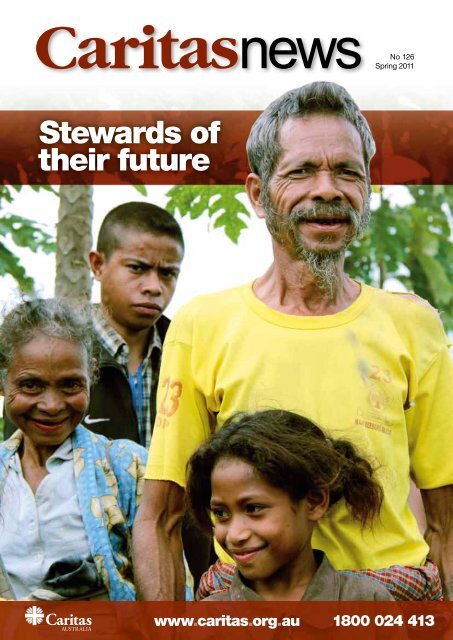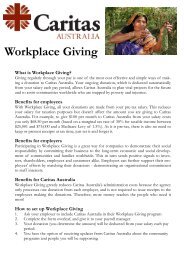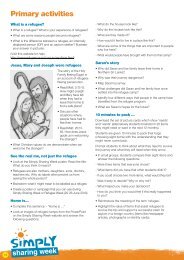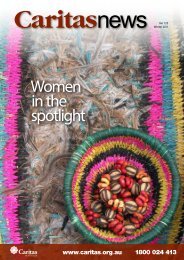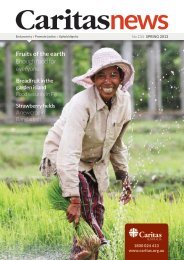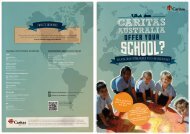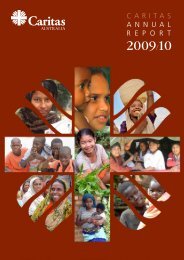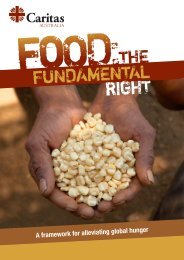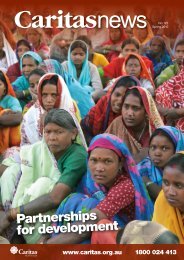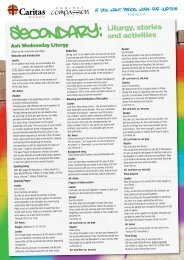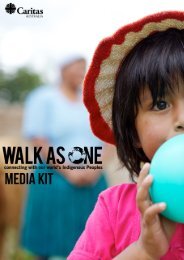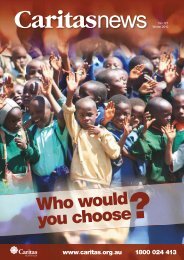In concert with Creation - Caritas Australia
In concert with Creation - Caritas Australia
In concert with Creation - Caritas Australia
- No tags were found...
You also want an ePaper? Increase the reach of your titles
YUMPU automatically turns print PDFs into web optimized ePapers that Google loves.
<strong>Caritas</strong> Supporter Survey <strong>Caritas</strong> Supporter Survey <strong>Caritas</strong> Supporter SurveyTell uswhat YOUthink!IN THIS EDITION of<strong>Caritas</strong>News, you’ll noticesomething a little different –a survey. We know you loveto hear how your money ismaking a difference aroundthe world, but do you lovethe way we share thosestories <strong>with</strong> you?On pages 7-10 of thisedition you have the chanceto tell us what you like,what you love, and what youthink we could do better.This is your opportunityto tell us what’s importantto you; after all, you makeour work possible – so youropinion is important to us.Your feedback will helpus better understand whatmotivates you to support<strong>Caritas</strong> <strong>Australia</strong>, and whatinspires you about ourwork. By completing thissurvey we can improve theway we share stories <strong>with</strong>you, and do more to inspireother <strong>Australia</strong>ns whoshare your commitmentto social justice.Your privacy is of upmostimportance to us so youcan choose to completethe survey anonymously.However if you’d like toreceive feedback about theresults of our research oryou’d like us to contact youabout <strong>Caritas</strong> <strong>Australia</strong>’swork in your communityand abroad, please leave yourdetails for us on page 10.You can complete thesurvey in hard-copy byremoving the 4-page insertand returning it to us bypost. Or you can provideyour responses online byvisiting www.caritas.org.auand following the links.Thank you forsupporting <strong>Caritas</strong> <strong>Australia</strong>– we look forward to hearingwhat you think.East AfricaCRISIS APPEAL“If there is hunger anywhere in the world, then our celebration of theEucharist is somehow incomplete everywhere in the world. <strong>In</strong> the Eucharistwe receive Christ hungering in the world. He comes to us not alone, but <strong>with</strong>the poor, the oppressed, the starving of the earth.” PEDRO ARRUPE SJ, 1976.THE DROUGHT AND foodinsecurity that engulfs East Africa isthe most severe humanitarian crisisin the world today. More than 12million people throughout Ethiopia,Somalia, Kenya, Djibouti, Eritrea,South Sudan, Uganda and Tanzaniaare in urgent need of food, water andbasic necessities. Up to 40 percent ofchildren in the region are sufferingfrom severe malnutrition – the time foraction is now.With frightening images emergingfrom the region, The United Nationshas declared the situation a FoodCrisis, <strong>with</strong> some communities nowexperiencing famine. The droughtin East Africa is not expected to easeuntil early 2012 and the numbers ofvulnerable people affected will risedramatically.Over the coming three to fourmonths, the region’s fragile foodsecurity will continue to deteriorate;the most vulnerable communities arepreparing for below-average summerharvests, early depletion of pasture andwater, and continued high prices offood, water and fuel.Across the region, the humanitarianneeds have been estimated at USD1.7 billion; nowhere near that amounthas been collected worldwide. <strong>Caritas</strong><strong>Australia</strong> has launched the East AfricaCrisis Appeal and we need your help!<strong>In</strong> partnership <strong>with</strong> the international<strong>Caritas</strong> network, our relief effortis underway <strong>with</strong> local partnersresponding to the communities’immediate needs – food, water, basicsupplies, and agricultural assistancein severely affected areas of Kenya,Somalia and Ethiopia and South Sudan.Through <strong>Caritas</strong> <strong>Australia</strong>’s EastAfrica Crisis Appeal, you can helpprovide food relief, clean water andbasic necessities, and help the mostvulnerable families to maintain theirlivelihoods in this time of crisis.For more information or to donateplease visit www.caritas.org.au/eastafricacrisis; call 1800 024 413; orpost your donations to GPO Box 9830Sydney NSW 2001.Where will your funds go?All funds raised through the appealwill be spent in assisting vulnerablepeople in East Africa. <strong>Caritas</strong> <strong>Australia</strong>commits to deliver at least 92 percentof all funds raised to the local partnersand communities directly.CARITAS NEWS spring 2011 | 3
Green gold fromJust two short years ago, dubesi – a remote village ofwest timor – was notoriously crooked. try to hold acommunity meeting after daylight hours and sure enoughyou’d leave the gathering a few possessions lighter.“AS SOON AS it got dark things couldgo missing,” recall <strong>Caritas</strong> partners,Joseph and Vincent from Yayasan MitraTani Mandiri (YMTM).“If you parked a car outside thevillage hall while having a meeting, thecar could go missing and people evenused to do gambling at the back of thehall.“The village had a history of beingfull of criminals and yet, we’ve turnedthat around.”<strong>Caritas</strong> <strong>Australia</strong> has beensupporting the innovative Foundationfor Partnership <strong>with</strong> <strong>In</strong>dependentFarmers in West Timor (YMTM),since 2004. The YMTM initiative wasfounded more than 20 years ago by agroup of uni students who believed thattheir study of agricultural science couldbe used to achieve social justice.“As students, we felt it just wasn’tsufficient to do research so we formeda group that did agro-forestry training<strong>with</strong> villages.“<strong>In</strong> the first three or four years wedidn’t have any money, we just livedin the villages to run discussions, andthe local people provided us <strong>with</strong> somefood.”Today YMTM is working in 98villages across five districts in WestTimor and Flores. For its work insome of <strong>In</strong>donesia’s most vulnerablecommunities, YMTM has achievedboth national and international acclaim.<strong>In</strong> 2010, YMTM was awarded theUnited Nations Development Program’sEquator Prize for poverty reductionand environmental conservation; itsentrepreneurial programs, innovativeagricultural techniques andirrigation methods have enabled poorcommunities to transform once dry,barren land into productive, agriculturalfarmland.So what does all of this have to do<strong>with</strong> the crime rate in Dubesi?Two years ago Barnabas was wellestablished as the Dubesi village thief.He tended a meagre garden and stolewhat he could to provide for his familyof 11. For Barnabas and his children,life in Dubesi was uncertain and riddled<strong>with</strong> risk.When we met Barnabas earlier thisyear, his life couldn’t have been moredifferent. Rather than ‘head of thethieves’, Barnabas was head of his localfarming group and his thriving gardennow produces more than enough tosupport a happy and healthy family.Of his new life, Barnabas says: “if Isteal, it’s easy but the money is quicklygone. I needed to learn to become agood farmer.“When YMTM first came to ourvillage we had a meeting to discuss ourchallenges, and then our next step wasto build [garden] terraces.4 | CARITAS NEWS spring 2011
“If I steal,it’s easy butthe moneyis quicklygone. <strong>In</strong>eeded tolearn tobecomea goodfarmer.”“We also built bamboo structuresto hold up the plants; we preparedseedlings; and after the rains we wereable to harvest some crops like papaya,banana and cassava.“Since YMTM has come, we’veproduced many different kinds of plants.From some we’ve been able to gain shortterm profits and others are long-termplants that we hope will be able tosupport our future in this village.“With the products we haveproduced over the last two years wewere able to buy kerosene for our lampsand were able to pay for our children’sschool; we’re also part of a savings andloans scheme organised by YMTM inour village.”Barnabas and the members of hisfarming group are just some of thehundreds of people you have helpedthrough YMTM’s unique, grassrootsdry landapproach to community programs. It isthe spirit of partnership that underpinsYMTM’s work that truly helpscommunities to help themselves.“Most of our staff is based in thevillages. They live there, year round –this is one thing that distinguishes ourapproach,” Vincent explains.“The people that we work <strong>with</strong>are very marginalised people; ifyou approach them as an outsiderit is often difficult to communicate<strong>with</strong> them and to understand theconditions in the village.“Our staff actually live in the village,the village chooses them and theybecome villagers themselves. Theyunderstand the conditions: they canwork alongside the local people whetherin the fields or <strong>with</strong> each household.“With Barnabas I’m sure he changedbecause of the relationship <strong>with</strong>YMTM staff – they spent a lot of time<strong>with</strong> him. He also did an exchange toanother district and learnt the differentmethods being used there.”For YMTM, the health ofcommunities is linked to the health ofthe land and of the local environment.Working in close partnership <strong>with</strong>Barnabas and his farming group,YMTM have not only enabledcommunity members to generate abona fide income – but also to befaithful stewards of the environmentalresources that will ensure a betterfuture for their children.“If you look at Barnabas’ garden now,it is much, much better than it was. Butmore than that, his garden is a greatsource of pride for him; he’s felt veryproud to show it to other people,” saysVincent.“We work <strong>with</strong> the poor to addressthe many challenges they face <strong>with</strong> arange of activities, including health andenvironmental education, agriculturaltraining, development of farmerinstitutions and advocacy to localgovernment. <strong>In</strong> the end, these issuesare all connected.”throughout west timor’s vulnerablefarming communities, ymtm’senvironmental management programscreate opportunities for generations tocome. By supporting caritas australiatoday or remembering us in your will, youtoo can leave a legacy of compassion forthe poorest of the poor in our global family.CARITAS NEWS spring 2011 | 5
After the deluge:a year of supportfor PakistanJust a few short weeks ago, the world stopped to rememberthose lives lost to Pakistan’s worst floods in eight decades.WITH THE IMAGES so vivid in ourmemories, it’s hard to believe it has been ayear since we looked on in horror as floodwaters smothered one-fifth of Pakistan,decimating roads and bridges, inundatingfarmland, and washing away markets,schools and homes.Two thousand lives were lost inlast year’s monsoons and more than20 million people were affected bywidespread damage to communityinfrastructure and the agricultural sector.But <strong>with</strong> your support before, duringand after the headlines, Pakistan’s worstaffected communities have had theopportunity to build back better.<strong>In</strong> the weeks and months followingthe floods, you gave almost $3 million toensure the protection of human life anddignity in Pakistan’s flooded communities.With your support and generosity, theinternational <strong>Caritas</strong> network was notonly able to supply urgent medical, foodand shelter assistance, but has also begunto facilitate new farming and incomegenerationopportunities to outlast theemergency relief effort.As floodwaters ravaged communitiesacross Pakistan, <strong>Caritas</strong> <strong>Australia</strong>’spartners mobilised a rapid responsethat saw upwards of 300,000 peopleaccess food, shelter, blankets, andcookware to see them through theworst. With access to health services andthe sanitation infrastructure necessaryto stem the spread of water-bornediseases, the <strong>Caritas</strong> network ensuredassistance to thousands of families, andenabled the reconstruction of morethan 400 vital water schemes, roads andbridges. Protected by an internationalcommunity of caritas, human dignitywas not lost in Pakistan’s deluge.With hundreds of international aidagencies scrambling to reach floodaffectedcommunities, short-term reliefhas been in steady supply. But whatbecomes of communities once the housesare sturdied and the roads restored?Pakistani farmer and shepherd,Kamal, knows all too well the value ofemergency aid, but as he looks to hisfamily’s future he knows these floodsleave a legacy of destruction.Kamal was born and raised in a smallvillage in the district of Jacobabad. It washere that he married his wife, Feroza;raised six children; and last September,spent weeks <strong>with</strong>out a home.Speaking to <strong>Caritas</strong> staff in his village,Kamal recalls how he and his familywere forced to sleep under the open skyuntil floodwaters receded; how he lost all20 goats and eight cows the family reliedupon; how overnight, his crops werecompletely destroyed; and how amidstthis chaos his youngest daughter wasborn.“We didn’t have any food. We had tosurvive through food donations providedby different organisations.”For millions of families like Kamal’s,donations can mean the differencebetween life and death in the aftermathof emergency. But when the food trucksleave town, communities require theskills, tools and markets to reinvigorate alocal economy.With your generous support for<strong>Caritas</strong> <strong>Australia</strong>’s South Asia FloodsAppeal, Kamal and his family received avoucher for wheat and vegetable seeds, aswell as a cash grant to rent a farm tractorand tube well to work and water his land.Now, months later, Kamal and hisfamily are stewards of a thriving wheatand vegetable garden. These new cropsnot only yield enough food to nourishthe family of eight, but will ensurethe income needed to pay off loansaccumulated from the harvest lost tothe floods; to buy new livestock andfarming equipment; and to cover thehealth expenses this young family willinevitably incur.From his experience this past year,Kamal knows that good humanitarianassistance stretches beyond the realms ofshort-term aid.“If we had not received your help, wewould have had to borrow more loansfrom our landlord and vendors, and addto an already unmanageable debt <strong>with</strong>25 percent interest rates.”Kamal says he thanks God and the<strong>Caritas</strong> network for their assistancebefore, during and after the headlines.Today he has the opportunity to takecare of what is most important, hisfamily.did you know that just $50 could supplyjerry cans for 10 families affected bynatural disaster.<strong>with</strong> you generous support today, we canprotect the most vulnerable communitiesno matter what they may face tomorrow.6 | CARITAS NEWS spring 2011
Supporter SurveyThank you for taking 10 minutes to complete our supporter survey. Your feedback will helpus better understand what motivates you to support <strong>Caritas</strong> <strong>Australia</strong>, and what inspires youabout our work. By completing this survey we can improve the way we share stories <strong>with</strong>you, and do more to inspire other <strong>Australia</strong>ns who share your commitment to social justice.If you’d prefer to complete the survey online, visit www.caritas.org.au and follow the links.Otherwise you can return your completed hardcopy survey to GPO Box 9830 SYDNEYNSW 2001. To help us process your response and provide feedback please return yoursurvey by 30 September 2011.You can choose to remain anonymous, but we would encourage you to leave yourcontact details if you feel comfortable doing so.Once again, thank you. We look forward to hearing what you think.Which of the following statements is mostaccurate about your experience <strong>with</strong> this & mostother issues of <strong>Caritas</strong>News?I read all of itI read most of itI read some of itI did not read any of itHow many people read your copy of <strong>Caritas</strong>News?Only myselfOther members of my householdI pass it on to colleagues, friends &/or familyDo you keep <strong>Caritas</strong>News as a resource?YesNoDo you enjoy reading the stories in <strong>Caritas</strong>News?YesNoDo you think the stories represent the diversecommunities you support through <strong>Caritas</strong>?YesNoDo you think the stories offer a unique perspectiveon aid, development & social justice news?YesNoWhat types information do you think <strong>Caritas</strong>Newsshould contain each quarter?(Mark in order 1 – most important; 8 – least important)Updates on the effectiveness of <strong>Caritas</strong>’ long termdevelopment workUpdates on the effectiveness of <strong>Caritas</strong>’ disasterresponse programsUpdates on <strong>Caritas</strong>’ education & communityadvocacy work in <strong>Australia</strong>Stories & profiles from our partners & colleagues inthe fieldStories & profiles from our supporters in <strong>Australia</strong>Analysis of issues facing the communities yousupport<strong>In</strong>formation about the ways you can donate<strong>In</strong>formation about non-financial ways to support<strong>Caritas</strong> <strong>Australia</strong> (events, lobbies, campaigns)CARITAS NEWS spring 2011 | 7<strong>Caritas</strong> Supporter Survey <strong>Caritas</strong> Supporter Survey <strong>Caritas</strong> Supporter Survey
<strong>Caritas</strong> Supporter Survey <strong>Caritas</strong> Supporter Survey <strong>Caritas</strong> Supporter SurveyPlease rate the following topics in terms of howmuch they interest you:Our programs in the PacificVerymuchSomewhatNeutralLittleOur programs in South Asia, Burma & East TimorVerymuchSomewhatOur programs in South East AsiaVerymuchOur programs in AfricaVerymuchSomewhatSomewhatOur programs in Latin AmericaVerymuchSomewhatNeutralNeutralNeutralNeutralLittleLittleLittleLittleOur programs in <strong>Australia</strong>n <strong>In</strong>digenous communitiesVerymuchSomewhatNeutralLittleOur education activities in <strong>Australia</strong>n schoolsVerymuchSomewhatNeutralParish & school fundraising activitiesVerymuchSomewhatNeutralLittleLittleOur campaigns & advocacy initiatives in <strong>Australia</strong>VerymuchSomewhatNeutralHIV & AIDS, Malaria & other diseasesVerymuchWater & sanitationVerymuchEcological sustainabilityVerymuchWomen & developmentVerymuchSomewhatSomewhatSomewhatSomewhatChildren & developmentVerymuchSomewhatEducation & developmentVerymuchSomewhatConflict & peace buildingVerymuchJustice & democracyVerymuchSomewhatSomewhatEconomic development initiativesDisabilityVerymuchVerymuchSomewhatSomewhatNeutralNeutralNeutralNeutralNeutralNeutralNeutralNeutralNeutralNeutralTheology & <strong>Caritas</strong> <strong>Australia</strong>’s missionVerymuchSomewhatPrayer resources & reflectionVerymuchSomewhat8 | CARITAS NEWS spRing 2011NeutralNeutralLittleLittleLittleLittleLittleLittleLittleLittleLittleLittleLittleLittleLittleNotat allNotat allNotat allNotat allNotat allNotat allNotat allNotat allNotat allNotat allNotat allNotat allNotat allNotat allNotat allNotat allNotat allNotat allNotat allNotat allNotat allWould you like to read about other topics?___________________________________________________________________________________________________________________________________________________________________________________________________________________________________________Please indicate how much you agree or disagree<strong>with</strong> each statement.<strong>Caritas</strong>News helps me to feel a personal connection<strong>with</strong> the communities I support around the world.StronglyagreeagreeNeutraldisagree<strong>Caritas</strong>News helps me to feel connected <strong>with</strong> acommunity of <strong>Caritas</strong> supporters in <strong>Australia</strong>.StronglyagreeagreeNeutraldisagreeStronglydisagreeStronglydisagreeThe stories in <strong>Caritas</strong>News motivate me to learn moreabout social justice & development.StronglyagreeagreeNeutraldisagreeThe stories in <strong>Caritas</strong>News motivate me to increasemy support for <strong>Caritas</strong> <strong>Australia</strong>.StronglyagreeagreeNeutraldisagreeStronglydisagreeStronglydisagree<strong>Caritas</strong>News shows me how my donation is making areal difference in the world.StronglyagreeagreeNeutraldisagreeStronglydisagree<strong>Caritas</strong>News helps me to understand the non-financialways I can support the <strong>Caritas</strong> mission.StronglyagreeagreeNeutraldisagreeAre most of the stories in <strong>Caritas</strong>News:(please choose one)Too simplistic & rhetoricalEasy to read & understandToo complex & difficult to understandStronglydisagree(please choose one)Too reliant on graphics & imagesAppropriately balances text <strong>with</strong> useful graphics &imagesIs text heavy <strong>with</strong> inadequate graphics & images(please choose one)Too short & shallowAppropriate in length & depthToo long & overly analytical
Do you like the design of <strong>Caritas</strong>News?YesNoIf no, what would you change?(eg paper type, overall length, design, layout, colours etc)______________________________________________________________________________________________How would you prefer to receive <strong>Caritas</strong>News?<strong>In</strong> hardcopy, 4 times a yearOnline <strong>with</strong> an email reminderOnline <strong>with</strong> a postal reminderIs the environmental efficacy of our newsletter’spaper & production methods important to you?Yes NoWhich of the following statements most accuratelyreflects your views (chose one):I support <strong>Caritas</strong> <strong>Australia</strong> because charity isimportant to my faith/moralityI support <strong>Caritas</strong> <strong>Australia</strong> because I want to helpthe poorest communities help themselvesI support <strong>Caritas</strong> <strong>Australia</strong> because I have a role toplay in securing justice & long-term development inour global community.Please indicate how much you agree or disagree<strong>with</strong> each statement.The principles of Catholic Social Teaching shouldunderpin all of <strong>Caritas</strong> <strong>Australia</strong>’s work.StronglyagreeagreeNeutraldisagreeStronglydisagree<strong>Caritas</strong> <strong>Australia</strong> should work <strong>with</strong> the poorest of thepoor regardless of race, religion, ethnicity.StronglyagreeagreeNeutraldisagree<strong>Caritas</strong> <strong>Australia</strong>’s work should help people to helpthemselves.StronglyagreeagreeNeutraldisagreeStronglydisagreeStronglydisagree<strong>Caritas</strong> <strong>Australia</strong> should provide fast, effective & robustrelief in times of emergency.StronglyagreeagreeNeutraldisagreeStronglydisagree<strong>Caritas</strong> <strong>Australia</strong> should work in schools to educate &inspire the next generation of <strong>Caritas</strong> supporters.StronglyagreeagreeNeutraldisagreeStronglydisagree<strong>Caritas</strong> <strong>Australia</strong> should engage <strong>with</strong> <strong>Australia</strong>n politics& public debate to advocate & lobby on behalf of thevulnerable communities we serve.StronglyagreeagreeNeutraldisagreeStronglydisagree<strong>Caritas</strong> <strong>Australia</strong> should collaborate <strong>with</strong> other<strong>Australia</strong>n development agencies to influence policyissues & broad social change.StronglyagreeagreeNeutraldisagreeStronglydisagreeDo you believe that the majority of your financialcontributions to <strong>Caritas</strong> <strong>Australia</strong> will reach thepoorest of the poor?Yes NoDo you believe your financial contributions to<strong>Caritas</strong> <strong>Australia</strong> are making a real difference inthe poorest communities?Yes NoDo you believe that your action & participation inadvocacy will help to uproot the structures thatperpetuate injustice & global poverty?Yes NoHow did you originally find out about <strong>Caritas</strong>?Word of mouth<strong>In</strong>ternetSocial MediaChurchSchool/UniversityAdvertisementDon’t Recall/OtherHow frequently do you make financialcontributions to <strong>Caritas</strong> <strong>Australia</strong>?MonthlyQuarterlyBi-annuallyAnnuallyDuring EmergenciesSporadicallyHow do you donate to <strong>Caritas</strong> <strong>Australia</strong>?OnlineBy phoneBy mail<strong>In</strong> personThrough Parish/School collectionWhat is the average amount of your individualdonations?
<strong>Caritas</strong> Supporter Survey <strong>Caritas</strong> Supporter Survey <strong>Caritas</strong> Supporter SurveyWhat motivates you to donate to <strong>Caritas</strong> <strong>Australia</strong>?<strong>Caritas</strong> refl ects my personal values/morality<strong>Caritas</strong> does the kind of work I am interested in<strong>Caritas</strong> is trustworthy & gives me plenty ofinformation about their work<strong>Caritas</strong> makes a real difference<strong>Caritas</strong> is working for social justiceIt is easy to make donations to <strong>Caritas</strong><strong>Caritas</strong> has a low administration ratioOtherHave you taken part in any of <strong>Caritas</strong> <strong>Australia</strong>’sadvocacy campaigns or lobby initiatives?A Just ClimateBe More WeekendPrayer for Peace in SudanAct for Democratic Republic of CongoHave a HAARTOther (please specify): _________________________Have you ever attended an event held by <strong>Caritas</strong><strong>Australia</strong>?Fish FridayBlueprint for a Better WorldPrecious MettleOther (please specify): _________________________Do you visit the Project Compassion website?Yes NoIf yes, what section of the website is of most relevanceto you?Stories and resources for SchoolsStories and resources for ParishesStories and resources for General CommunityHow frequently do you visit the <strong>Caritas</strong> <strong>Australia</strong> site?Never once a year twice per yearmonthly weekly dailyWhy do you use the <strong>Caritas</strong> <strong>Australia</strong> website?(Rank from 1 – most important to 7 – least important)To fi nd out who <strong>Caritas</strong> <strong>Australia</strong> isTo learn about the countries that <strong>Caritas</strong> <strong>Australia</strong>works inTo explore issues related to aid and developmentTo learn about an emergency and the <strong>Caritas</strong>responseTo fi nd out how I can take action (non-fi nancial)To donateTo visit the Project Compassion websiteAre you an active member of <strong>Caritas</strong> <strong>Australia</strong>’sonline community via social networking sites?Twitter Facebook YouTube10 | CARITAS NEWS spring 2011Gender:MAgeF18-34 35-44 45-5455-64 65-74 75+Marital status:SingleState/Territory:MarriedQLD NSW VIC TASSA WA NTWhich of the following best describes your highestlevel of education?Some secondary schoolCompleted secondary schoolTAFE or other trade qualifi cationUniversity (undergraduate degree)University (postgraduate degree)Prefer not to answerWhich of the following best describes youremployment status?Working full-timeWorking part-timeCasual employmentNot workingRetiredPrefer not to answerHow long have you been a <strong>Caritas</strong> <strong>Australia</strong> supporter?< 1 year 1-3 years3-5 years 5-10 years10+ yearsWould you like to hear from us about the results ofthis survey?Name ________________________________________Address ______________________________________Phone ________________________________________E-mail _______________________________________Would you like us to contact you about any of thefollowing:Hopegiver/Workplace GivingGrowing Spirit (Bequests)Advocacy & Community campaignsEducation & Prayer resources
forPHOTOS: RICHARD WAINRIGHTin august this year, thousands of australians took astand for A Just Climate. why? Because the impacts ofan increasingly volatile climate routinely cast the poorestof the poor to the margins of opportunity.“OUR FAMILY HAS lived here for over100 years and it used to be all greenrice fields,” says Bikash Mondal as hegazes out over the grey, muddy terrainthat surrounds his crab fattening farm.“The land is unrecognisable to whenI was growing up.”The only splash of colour left in thisrural Bangladeshi village is the brightlydecorated saris worn by village womenas they navigate the slippery banks oftheir damaged fields.When Bikash was growing up,his parents had a small farm theydepended on for rice and vegetablesbut over time, their traditional lifestylebecame unreliable. Bikash explains:“I noticed slowly the rice productiondecreasing and the salinity of the areaincreasing. We also had cattle when wewere young but had to sell them as thegrazing land just disappeared.”Over the years, rising sea levelshave dramatically increased theconcentration of salt in once fertilesoils; today, farmers like Bikashstruggle to produce enough crops to eatand to sell for profit.Like many of his fellow villagers,Bikash knew that the yield from hispaddy fields could not support hisyoung family so he found work inthe local crab market. It was herethat Bikash first heard how <strong>Caritas</strong><strong>Australia</strong> was helping communities toadapt to the livelihood challenges ofenvironmental degradation.“Someone from <strong>Caritas</strong> came andinspected my fields,” Bikash explains.“They told me they would be suitablefor a crab fattening business. My familyhas always been involved <strong>with</strong> fishing soI thought I’d give it a go.”After taking out a loan to purchaseequipment, Bikash learnt new skills tocare for, fatten and market his crabs.With the support of <strong>Caritas</strong> <strong>Australia</strong>,Bikash now has a profitable businessbuying undersized crabs at a low price,12 | CARITAS NEWS spring 2011
communityofacaritasPrecious MettleBy now, you’ve probablyheard us talk about a‘community of caritas’, buthave we ever really saidwhat that means?as a supporter of caritasaustralia, you know thatour name is synonymous<strong>with</strong> compassion andlove. in your relationship<strong>with</strong> us, you sharea compassionaterelationship <strong>with</strong> ournetwork of supporters,local organisations, andthe communities weserve. Never more is thisapparent than when youcome together in the nameof solidarity, justice, and ofcourse, a good time.PETER DOYLE’S AT the Quay:exquisite seafood; fine dining on theSydney Harbour’s edge; a first class viewof the Opera House; and worlds awayfrom the Democratic Republic of Congo(DRC), in the heart of Africa.It may be worlds away from the DRC,but on 9 June 2011, it was the DRC – notthe fair prospect – that took centre-stageas <strong>Caritas</strong> <strong>Australia</strong> and Peter Doyle’sfamed restaurant presented PreciousMettle: a fundraising dinner for <strong>Caritas</strong>supporters in Sydney.Hidden far from view, in EasternDRC, communities are embroiled in aviolent struggle for land and for control ofthe nation’s vast mineral wealth.Coltan (columbite-tantalite) is themineral used to miniaturise our mobilephones, laptops, and other electronics.Coltan is the mineral at the heart ofconflict in the DRC.The DRC is believed to hold theworld’s largest deposit of coltan. Expertsbelieve that most coltan mining operationsare conducted illegally <strong>with</strong> the enormousprofits used to fuel a brutal conflict.Armed combatants fight openly for controlof the coltan industry and subsequently,violence, abuse, and debilitating povertyare a daily reality for many communities –particularly for women.Speaking to ABC television and radiopresenter Geraldine Doogue, who MC’dthe Precious Mettle event, former DRCresident and <strong>Caritas</strong> <strong>Australia</strong>’s AfricaProgram Coordinator, Lulu Mitshabu,explained what life is like in the heart ofAfrica.“The situation is chaotic. It is ahumanitarian disaster that is unfoldingbefore our eyes.“At first it is easy to be taken aback bythe sheer hopelessness of the country’scurrent predicament, but there iscertainly hope.“Our Catholic faith calls on us touphold the life and human dignity of theperson by alleviating human sufferingand promoting justice and solidarityworldwide. This is what we are called todo in the Congo.”Lulu said unnecessary death andabuse has become commonplace in DRC.“Perhaps worse than the loss of lifeis the staggering numbers of humanrights violations – torture, mutilationand sexual violence – that has occurredagainst tens of thousands of women andchildren,” she said.“This humanitarian crisis demandsimmediate action and <strong>with</strong> help fromordinary <strong>Australia</strong>ns, <strong>Caritas</strong> is providingassistance to the most vulnerable peoplein the society: women, and of coursechildren.”<strong>with</strong> your help we can restore justice for thevictims of conflict in the congo. For just $1 aday you could provide a loan for 10 survivorsof violence to create a community farm indemocratic republic of congo.to learn more visit www.caritas.org.au/donate14 | CARITAS NEWS spring 2011
Make a lastingdifferenceThe effects of a more extreme and volatileclimate are already a daily reality for manyof the world’s poorest and most vulnerable.Take a stand in solidarity and assist communities livingin poverty by becoming a hopegiver, and together wecan tackle the urgent challenge of climate change.is <strong>Caritas</strong> <strong>Australia</strong>’s regular givingprogram. As a regular giver you are assisting toeffectively ensure the continuation of life changingcommunity projects worldwide.By becoming a monthly giver you will:• Have your monthly tax deductible donationconveniently deducted from your credit card or bankaccount• Receive only one tax receipt at the end of the year• Lower our administration costs and give more tothose who need it most• Receive a magnetic photo frame and beautifulquarterly postcardsPlease become atoday and start changing lives. Simply fill-in the coupon below or visit www.caritas.org.au/hopegiver and apply online.Yes, I will become aYour detailsdonor Number (if known)and donate monthly…Credit card optionPLeaSe SeLect EiTHEr the credit card Or direct deBit oPtioNi authorise caritas australia to charge the above-mentioned amount to mycredit card on the 27th of each month.mastercard ViSa amex diner’s clubName ms miss mrs mr or other ___________addressName on cardcard numberexpiry dateSuburb State PostcodeSignaturedatePhoneParishDirect debit optionemailamount:$35 $40 $65 other $: (minimum $10)I/We authorise <strong>Caritas</strong> <strong>Australia</strong> (User ID 064 695) to debit the above mentioned amount from my/ouraccount on 27th of each month at the fi nancial institution identifi ed below. Acting on my/our instructionsthe User may, by prior arrangement and advice to me/us, vary the amount for future debits.Financial institution name & branchPlease post or fax the completed form to caritas australiaPlease fax back to 1800 887 895 or post to caritas australia,gPo Box 9830, Sydney NSw 2001.BSBaccount nameaccount NoBefore payments commence, caritas australia will provide you <strong>with</strong> a fullService agreement and confi rmation of your details regarding this arrangement.payments will be deducted on 27th of the month. if this is not a normalbusiness day, payment will be deducted on the next normal business day.i would not like to receive information about the work of caritas australiaprivacy statement: the information provided by you will only be used for the purposeof giving you information about ‘hopegiver’ and the activities of caritas australia.Become aonline www.caritas.org.au/hopegiverSignatureSignaturedatedatei would like to receive information about includingcaritas australia in my willhgr3 – mgd


